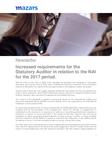
Increased requirements for the Statutory Auditor in relation to the NAI for the 2017 period.
Decree 2132 of 2016 has 1,047 pages, basically divided into two bodies; the first one related to the Code of Ethics Manual for Accounting Professionals and the second one related to Quality Control, Auditing, Reviews, Other Assurance Engagements and Related Services.
The content of the standards is based on documents issued by the International Auditing and Assurance Standards Board (IAASB) and other Boards, which are supported by the International Federation of Accountants (IFAC).
An accounting professional will not have complied with the IAASB Standards unless he/she has fully complied with all the standards of the "engagement", where the concept of "engagement" is understood as the exercise of an assurance or audit by an accounting professional to express a conclusion or opinion on some information in the context of the ISAs. However, this will only be mandatory for public accountants that provide their services to Group 1 entities, or Group 2 entities that have more than 30,000 SMMLV of assets or more than 200 employees, or tax auditors that do not belong to Group 1 and that voluntarily joined such group, among other cases.
The ISAs have a set of standards that must be complied with by the professional accountant, among them, ISA 210: Agreements on the terms of the audit engagement, ISA 220: Quality Control over the Audit of Financial Statements, ISA 230: Audit Documentation, ISA 240: Auditor's Responsibilities for the Audit of Financial Statements with respect to Fraud and ISA 4410, which depending on the scope of the engagement, some of them are not used.
In practice, the use of these standards will improve the quality of professional accountants and the standardization of procedures and functions of statutory auditors.
With the exit of Decree 2649 of 1993 (former generally accepted accounting principles) and with the entry of the International Financial Reporting Standards (IFRS), the professional accountant has to face two complex and extensive standards, never compared to the old functions and extinct regulations.
The essential objective of the IAS is not to demand more work from the professional accountant, but to provide greater assurance to the audited entity with respect to the risks it faces, accounting errors and opportunities for improvement associated with internal control and corporate governance. In conclusion, the implementation of the IAS will allow the protection of the interests of shareholders, management, employees, capital market, as well as the professional accountant and all those who are users of financial information, as well as collaborators of the entity and auditing entities.


